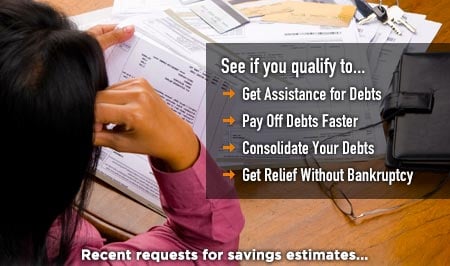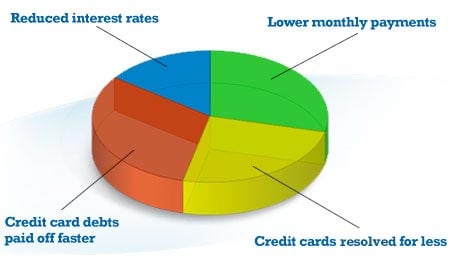
Government Debt Relief?
Largely as a direct result of the recent government debt relief bailouts and programs for banks and other financial institutions, there has been a strong interest and need to clarify exactly what the government is doing and not doing to help everyday consumers in need of debt relief. The bottom line: When it comes to credit card debt relief, the government is not providing any type of direct assistance, grants, or aid to help consumers pay off, reduce, or eliminate credit card debt.
However, the good news is that credit card companies may, depending on your situation, agree to provide relief from debts via reducing interest rates, removing late fees and penalties, or even forgiving or settling your credit card debt for less than you owe. Is debt relief right for you and how much could you save?
Every individual or family financial situation is unique. To find out what debt relief could do for you and how much you could save, begin online to get your free debt relief analysis and savings estimate.
Government Debt Help
Even though the government does not have a government debt consolidation, credit counseling, or debt relief grant program for consumers in need, it is important to note that at both the state and federal government levels, much has been done to assist and protect the rights of credit card holders and other debtors. Let's review a few areas where government is working on behalf of consumers to help debts become more manageable:
Credit Card ACT of 2009
While all consumers bear the responsibility for paying off the debts that they incur, in recent years aggressive credit card company practices have, at least in part, contributed to the raging level of unsecured debt that has hit Americans. In response to this, The Credit Card Accountability Responsibility and Disclosure Act of 2009 was a federal statute that was passed and signed into law by President Barack Obama on May 22, 2009. Some nine months later, February 22, 2010, the bill went into effect.
While the Credit Card Act of 2009 does not put restrictions or controls on credit card company pricing, interest rate caps, or fee setting - it does provide some outstanding provisions and protections for consumers. This demonstrates how government debt help can be provided to consumers in a proactive way that helps to provide a first-line-of-defense type of debt relief that launches a direct attack on the credit card debt problem - at its source.
Many citizens and many in Congress believed, rightly so, that the credit card company revolving debt machine had gotten out of hand. Arbitrary rate increases, failure to give significant advance notice of rate increases, hard-to-read credit card company disclosures and agreements, and a deplorable credit card company practice called Universal Default, were among the contributing factors to the debt epidemic.
Thus, the Credit Card Act of 2009 now requires credit card companies to give 45 days advance notice of a rate increase. And, if the cardholder elects to cancel the card in question, they are allowed to pay off the balance at the older, existing rate, not at the new higher rate. In addition, credit card companies are no longer allowed to retroactively increase interest rates on the balance of a cardholder in good standing for reasons that have nothing to do with the cardholder's payment record with that particular card. In the past, credit card agreements that included the Universal Default provision allowed credit card companies to hike up rates suddenly, upon basically any change at all in the credit "profile" of the individual. That means you could be paying a 10% interest rate on a card and have a perfect payment record with that card, but if you applied for credit, bought a car, or even were late on a different credit card - the card that you had a perfect record with could look at those events, totally unrelated to your payment record with them, and decide to hike your rate from 10% to, let's say, 29%! This was a predatory practice that was no doubt highly profitable for credit card companies, but one that dealt a crushing blow to consumers - many of whom were already deep in debt.
So, while the government does not provide credit card debt relief grants, debt management, debt consolidation aid, or special programs to bail out everyday consumers from their debt, these provisions and others from the Credit Card Act of 2009 go a long way towards helping consumers.
Mortgage Debt Relief
In addition to credit card relief legislation, the government has also stepped up to help consumers who have been hit by the sub-prime credit meltdown. The United States Department of Housing and Urban Development (HUD) now assists consumers via a program call the FHA Secure loan program. This helps provide aid for homeowners who are facing possibly foreclosure and may need to refinance a subprime credit mortgage. For more information on the FHA Secure loan assistance program go to FHA Secure Guidelines
Federal Student Loan Consolidation
Another area where the government is helping to provide consumers with debt relief is in the area of federal student loan debt consolidation. This programs allows debtors to consolidate all federal student loans into a single lower interest rate loan and make a single, easier payment each month. It is important to note that this loan consolidation program only applies to federal student loans and not privately funded loans.
State Economic Assistance
In addition to federal economic relief aid, the state of Texas also has a variety of programs available to help consumers in need of relief. As is the case with the federal government, Texas does not have credit card relief programs, grants, or consolidation loans to help consumers pay off their credit card debt obligations.
However, for individuals who are struggling - including low income families, the elderly, and those needing medical assistance the state does offer several areas of support. One resource that may be helpful to Texas residents in distress is "Help for Texans" at //www.tdhca.state.tx.us/texans.htm. In addition, there may be state resources that can help Texas residents in need of food, clothing, medical assistance, housing assistance, energy crisis support to help reduce utility costs, and more. For information on state economic aid resources:
If you are in need of relief from credit cards and other unsecured debts, you can get a free debt relief analysis and savings estimate at no obligation. Begin online by answering a few questions regarding your financial situation.























